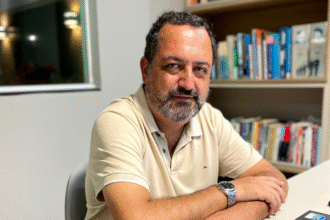The excerpt you shared describes the plot of the book “Among Many Voices” by Marco Antonio Martire. The work appears to address themes such as artistic aspirations, family conflicts, alcoholism, loneliness and the complexities of Brazilian society. Martire uses the interaction between the two characters, Domânica and Vianna, to explore these themes and highlight the contradictions and hypocrisies in personal relationships and society in general. The setting in a beer bar in Rio de Janeiro helps to show the different realities that intertwine in everyday life.
The balanced narrative between dialogue and the protagonists’ internal thoughts allows readers to learn about these characters’ perspectives, their internal struggles and how their lives intertwine.
In the broader context, the book appears to address social and political issues, such as the rise of fascism in Brazilian politics, which adds an additional layer of complexity to the narrative.
Overall, “Among Many Voices” appears to be a work that offers a profound reflection on life, individual aspirations and social tensions in contemporary Brazil. It could be an interesting read for anyone who wants to explore these themes.
“Among Many Voices” seems to explore the meeting of two distinct realities in the environment of a bar. Can you tell us more about the setting and how it influences the book’s narrative?
Part of the narrative takes place inside a bar. This is where the characters meet, with Domânica and Vianna as the protagonists. The entire narrative takes place based on the personalities of these two characters and what they are doing there. Vianna drinks, smokes, yells at other patrons without anyone listening to her. Domain’s presence is a mystery, what is she doing there, what does she expect from a relationship with such a hostile figure? I believe this question continues until the end of the book. I have doubts whether it is truly answered.
The main characters, Domânica and Vianna, have very different characteristics. How did you develop these personalities and what did you want to convey through them?
Vianna was easier. Since he was creating a bar, he needed to put in it a drunk, a hateful figure, who despised the other patrons. All his prejudice was born from there. Domenica was more difficult, she needed to create a motivation for her to accept dialogue with such a prejudiced figure. Even today I doubt whether I was right in exposing such an admirable girl to such a determining source of prejudice. But I think the fight with the family comes into play, it is the driving force that makes Domânica accept this dialogue.
The book’s narrative includes elements such as the growth of fascism in the Brazilian context. How did you address these political and social issues in the story?
The political issue is all in the speech of Vianna, a rich journalist, respected to a certain extent, but an alcoholic, who gradually loses his voice. Between the 10s and 15s, when the first version of this book was written, issues such as fascism in the Brazilian political and social context seemed buried. That’s why, fortunately, Vianna’s voice gradually disappears. But the scenario took a turn at the end of the decade, and fascism emerged. I then realized that I had made a portrait of this rebirth.
The book balances dialogues and internal thoughts of the characters. Can you share more about your choice of narrative style and how it contributes to the story?
It wasn’t a choice, the book simply wrote itself that way. I am aware that in the contemporary Brazilian literature scene people are writing in a very different way. We are valuing multiple narrative discourses, which is excellent. I think today I want to write something else along these lines.

Marco, you are the author of other books, including “Capoeira Angola Manda Chama”. How did your writing style evolve from one work to the next?
My book about capoeira was written when I was in my early 20s. I consider it an excellent book, part of the best I have produced in recent years. He has a language completely designed to reflect the universe of capoeira Angola, which was a beautiful feat on my part. If, on the one hand, some ideas are dated, on the other, the exercise in language has remained, still delivering a beautiful work to the reader today.
The title “Among Many Voices” suggests the idea of voices trying to stand out among a universe of voices. How does this concept relate to the plot of the book?
The concept of the book was designed for a plot that valued the buzz present in a bar room. The countless voices, the conversations that intersect and mix as the waiters come and go bringing orders. The orders themselves being placed at the tables for the hurried waiters. The movement at the counter, the coming and going of the kitchen. All of this helps to create a kind of soundtrack that reaches and supports us.
The work seems to explore hypocrisy in interpersonal relationships. Can you tell us more about this theme and how it unfolds in the story?
Hypocrisy is present in Domenica’s family, who live the illusion of a perfect relationship. So they have a perfect marriage and the perfect daughter, who doesn’t cause any problems, obeys the orders of her bossy mother, who even gets involved in choosing her career. In fact, the mother has work-related self- esteem issues and will suffer a major setback in her expectations regarding her own marriage.
Vianna is a character with alcoholism problems and partial loss of his voice. How do these characteristics affect the way he relates to Domânica and the world around him?
There it is. It doesn’t seem to affect it. Vianna is completely surrendered at the bar table and all he can do is distill his prejudice, which arises from the absurd idea that he who has money can then say and do everything. It is not known how much of his voice the other regulars hear, but the truth is that the only one interested seems to be Domânica. Why I don’t know. I’d bet it’s out of compassion. She’s a good girl, but she doesn’t know who she’s messing with, she doesn’t know how much she’s absorbing from so much prejudice that she hears the drunk exude.
What is the main message or lesson you hope readers take away from “Among Many Voices”?
Chase your dreams, but be careful who you get involved with, sometimes it just isn’t worth it. Life is about showing other paths.
In addition to this book, you also have texts in collections and anthologies. What inspires you to write and what are your future literary projects?
I went through a personal crisis in which I am reviewing my entire literary project. I feel like doing workshops, reading, finding my own time in my day for literature. Not to say I’m not doing anything, I’m writing a new novel. I intend to work with him in workshops and enter him in literary competitions.
Follow Marco Antonio Martire on Instagram





